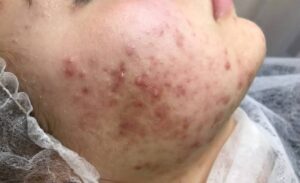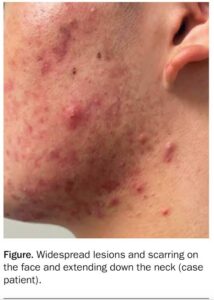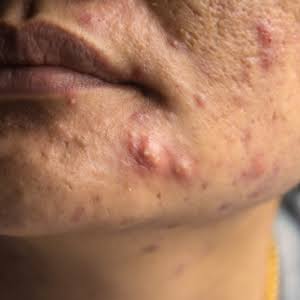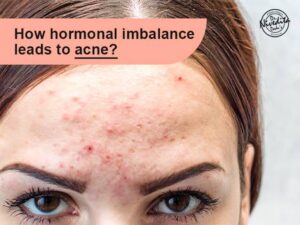Jawline acne is a common type of facial acne that can affect people of all ages and skin types. Often, jawline acne is associated with hormonal changes, stress, or other lifestyle factors that can lead to breakouts specifically along the jawline and chin. Understanding the different types, causes, and treatments can help you manage and treat jawline acne effectively.
Types of Jawline Acne
Jawline acne can present in various forms, and identifying the type can guide effective treatment options.
- Comedonal Acne

Comedonal acne includes blackheads and whiteheads. These are non-inflammatory forms of acne that occur when pores are blocked by excess oil, dead skin cells, or bacteria.
- Papules and Pustules

These are small, inflamed bumps that may appear red and tender. Pustules contain pus, while papules are hard and don’t have visible pus at the surface.
- Cystic Acne

Cystic acne is the most severe type and occurs when deeper skin layers become inflamed. These are painful, large cysts that may not respond to over-the-counter treatments and often leave scars.
- Hormonal Acne

Hormonal acne is particularly common on the jawline and chin, often appearing as deeper, painful cysts or inflamed nodules. This type is frequently linked to hormonal fluctuations.
Causes of Jawline Acne
Several factors can contribute to the development of acne along the jawline. Understanding these can help in selecting appropriate treatments and preventive measures.
- Hormonal Changes
Hormonal fluctuations, especially during puberty, menstruation, pregnancy, and menopause, are common triggers for jawline acne. Hormones like androgens can increase oil production, leading to clogged pores.
- Poor Skincare Habits
Using products that clog pores or neglecting to cleanse the face properly can lead to jawline acne. Additionally, certain makeup, hair products, and heavy moisturizers can trigger breakouts in this area.
- Diet
Foods high in sugars, dairy, or refined carbohydrates can lead to insulin spikes, which may exacerbate acne. High-glycemic foods and dairy have been particularly associated with jawline breakouts.
- Stress
Chronic stress can increase the production of cortisol, a hormone that may lead to increased oil production and inflammation, making jawline acne worse.
- Touching the Face
Frequently touching the jawline, resting your chin in your hands, or using mobile phones that press against your face can introduce bacteria and oils, contributing to breakouts.
- Genetics
Acne can be hereditary. If you have a family history of acne, you may be more prone to developing jawline acne.
—
Treatment Options for Jawline Acne
Treating jawline acne involves a combination of skincare routines, lifestyle changes, and potentially medical intervention for more severe cases.
- Topical Treatments
Benzoyl Peroxide: This antibacterial agent helps to reduce acne-causing bacteria and inflammation. It’s available in various strengths and is often effective for mild to moderate acne.
Salicylic Acid: This beta hydroxy acid (BHA) penetrates into pores to remove dead skin cells and excess oil. It can help prevent clogged pores and is especially effective for blackheads and whiteheads.
Retinoids: Retinoids are vitamin A derivatives that help prevent clogged pores and reduce inflammation. They are available over-the-counter (like adapalene) and in stronger prescription forms.
Azelaic Acid: Known for its anti-inflammatory and anti-bacterial properties, azelaic acid can help reduce acne and hyperpigmentation associated with jawline acne.
- Oral Medications
Antibiotics: For moderate to severe cases of inflammatory acne, oral antibiotics may be prescribed to reduce bacteria and inflammation.
Hormonal Treatments: Oral contraceptives and anti-androgen medications, like spironolactone, can help women manage jawline acne triggered by hormonal imbalances.
Isotretinoin: For severe cystic acne that doesn’t respond to other treatments, isotretinoin (commonly known as Accutane) may be prescribed. It’s a powerful medication that permanently reduces oil production but requires careful medical supervision.
- Lifestyle and Dietary Adjustments
Dietary Changes: Reducing intake of dairy and high-glycemic foods may help prevent breakouts. Instead, opt for whole grains, lean proteins, and plenty of fruits and vegetables.
Stress Management: Managing stress through exercise, meditation, and adequate sleep can help balance cortisol levels, potentially reducing acne flare-ups.
Hydration: Drinking enough water supports skin health, helping to flush out toxins and keep skin clear.
- Professional Treatments
Chemical Peels: A dermatologist can provide chemical peels with salicylic acid or glycolic acid to exfoliate the skin, helping reduce breakouts and improve texture.
Laser Therapy: Laser treatments target and reduce acne-causing bacteria and can help reduce scarring from jawline acne.
Extraction and Facials: Professional extraction of blackheads and whiteheads can prevent future breakouts and is best performed by a licensed skincare professional.
- Home Remedies
Tea Tree Oil: Known for its antibacterial properties, diluted tea tree oil may help reduce the severity of acne. Apply it sparingly, as it can cause irritation if used in excess.
Green Tea: Applying a green tea solution or using products with green tea extract may reduce inflammation and soothe the skin.
—
Preventing Jawline Acne
Prevention is key to managing jawline acne over the long term. Here are some daily habits that can help:
Cleanse Your Face Regularly: Use a gentle, non-comedogenic cleanser morning and night to keep skin clean and prevent clogged pores.
Avoid Touching Your Face: Try to keep hands away from your face to reduce the transfer of oils and bacteria.
Choose Non-Comedogenic Products: Opt for skincare and makeup products labeled “non-comedogenic,” which are less likely to clog pores.
Change Pillowcases and Towels Often: Regularly washing your pillowcases and face towels helps reduce exposure to bacteria.
—
When to See a Dermatologist
If jawline acne persists despite over-the-counter treatments or becomes severe, consult a dermatologist. Professional guidance is important, particularly if acne is causing scarring or is associated with hormonal imbalances that require prescription treatments.
—
Conclusion
Jawline acne can be frustrating, but understanding the types, causes, and available treatments can make it manageable. With the right skincare routine, lifestyle adjustments, and, if necessary, medical intervention, you can effectively treat and prevent jawline acne for healthier, clearer skin.

